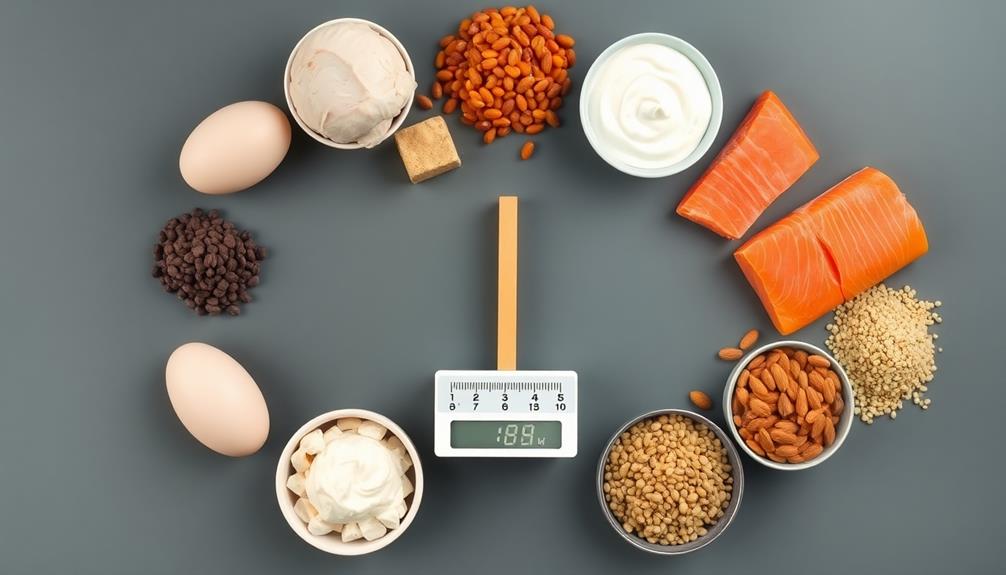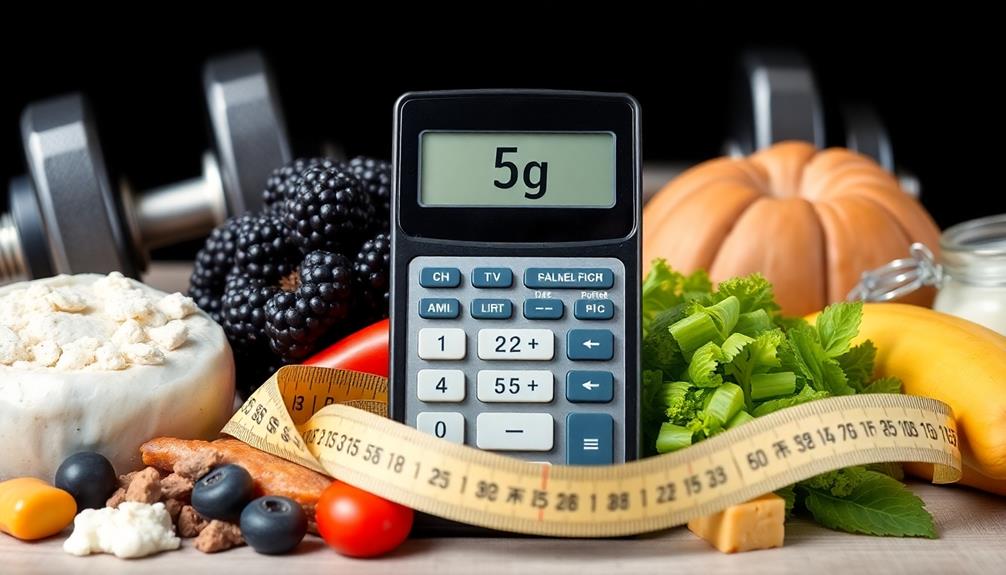The 5g protein per lb rule is a popular guideline for calculating protein needs, especially among bodybuilders and athletes. In order to use it, simply multiply your body weight in pounds by 5 to determine your daily protein intake in grams. For instance, if you weigh 150 lbs, you'd aim for 750g of protein daily. However, this rule may not suit everyone's needs. Your ideal protein intake depends on factors such as body composition, activity level, and fitness goals. It is crucial to take these variables into account and seek advice from a professional for personalized recommendations. Understanding how to adjust your protein intake can help you optimize your nutrition and achieve your health objectives.
Core Insight
- The 5g per lb rule suggests consuming 5 grams of protein for every pound of body weight.
- Multiply your weight in pounds by 5 to calculate your daily protein intake using this guideline.
- This high protein intake is often used by bodybuilders and athletes for muscle building and recovery.
- The 5g per lb rule may exceed general protein recommendations for most individuals.
- Consult a healthcare professional to determine the appropriate protein intake for your specific needs and goals.
Understanding Protein's Role

Protein is essential for our bodies. It plays a key role in almost every biological process. Protein is the building block for muscles, tissues, and organs. It's also important for growth, repair, and keeping your body healthy. Fitness experts suggest using whey protein powders that usually have 24-25g of protein per serving. This makes it easy to get enough protein each day.
When you eat protein, your body breaks it down into amino acids. These amino acids are then used to make new proteins that your body needs. They're important for:
- Building and fixing muscle tissue
- Supporting your immune system
- Making enzymes and hormones
- Keeping your skin, hair, and nails healthy
- Moving nutrients throughout your body
Protein also helps you feel full for a longer time, which can help with weight management. It's important to eat enough protein every day because your body doesn't store it like it does with fats and carbohydrates.
The 5g Per Lb Rule

The 5g per lb rule is a simple guideline for protein intake. It says you should eat 5 grams of protein for every pound you weigh. So if you weigh 150 pounds, you'd try to eat 750 grams of protein each day (150 x 5). Bodybuilders and athletes who want to build muscle like this rule. Many protein powders are made to help reach these high protein goals. They have 20-30g of protein in each scoop.
But this rule doesn't work for everyone. For most people, it's too much protein and can make you eat more calories than you need. The average person usually needs less protein, about 0.8 to 1 gram per pound of body weight. How much you need depends on things like how active you are, your age, and your overall health.
Before you start eating a lot more protein, always talk to a doctor or dietitian. They can help you figure out the right amount for your own needs and goals.
Calculating Your Protein Requirements

Calculating your protein needs is easy. First, find out how much you weigh in pounds. Then multiply that number by 0.36. This gives you the amount of protein in grams that you should eat each day.
For example, if you weigh 150 pounds:
150 x 0.36 = 54 grams of protein per day
To get this much protein, you could eat foods like:
- 1 cup of chicken breast (31 grams)
- 2 eggs (12 grams)
- 1 cup of lentils (18 grams)
Adjusting for Body Composition

Adjust your protein intake based on your body composition and goals. If you have extra body fat, calculate your protein needs using your lean body mass, not your total weight. This will keep you from taking in more protein than you need.
If you want to build muscle, you may need to eat a bit more protein than the basic calculation suggests. If you want to maintain your physique, stick with the standard recommendation.
Think about how active you are, too. If you work out hard or often, eating more protein can help your muscles recover and grow. These are just guidelines, so keep an eye on your progress and energy levels to figure out the protein intake that works best for you.
Activity Level Considerations

Your activity level affects how much protein you need. The more you exercise, the more protein your body needs to build and repair muscle. If you work out regularly or play sports, you'll need more protein than people who don't exercise much.
Here are three main activity levels to think about:
- Sedentary: You don't exercise much and spend most of your time sitting.
- Moderately active: You exercise 3-5 times a week.
- Highly active: You do intense training or physical work every day.
If you're moderately active, try to eat closer to 1 gram of protein per pound of body weight. If you're highly active, you might need up to 1.7 grams per pound. It's important to adjust how much protein you eat based on how active you are and what your fitness goals are. Protein powders can be a good way to add more protein to your diet, especially if you exercise a lot or want to build muscle.
Age and Protein Needs

Your body's protein needs change as you age. When you're a baby or child, you need more protein for each pound of body weight. This extra protein helps you grow and develop. Teenagers also need a lot of protein for growth and puberty.
Adults have stable protein needs, but may require more if they exercise a lot or are pregnant. As you get older, you might need to eat more protein again. This is because aging can cause muscle loss, which is called sarcopenia. Older adults often need extra protein to keep their muscles healthy and strong. Taking a creatine supplement along with eating enough protein can also help support muscle health, especially for seniors. Choose a high-quality creatine supplement for the best results.
Protein Sources and Quality

Protein quality and bioavailability vary a lot depending on the source. When picking proteins, think about both animal and plant options. Animal proteins have all the necessary amino acids, but most plant proteins don't. You can mix different plant proteins to get complete protein profiles though. The quality and source of ingredients really matter for supplements because they affect how well your body absorbs and uses the protein.
Three great protein sources are:
- Lean meats (chicken, turkey, fish)
- Eggs and dairy
- Legumes and quinoa
Protein quality comes down to how easy it is to digest and the amino acid profile. Animal proteins are absorbed and used by the body better. Plant proteins sometimes have lower amounts of certain amino acids but also give you fiber and antioxidants. For the best nutrition, eat a variety of protein sources.
Timing Your Protein Intake

Timing your protein intake is crucial for maximizing muscle growth and recovery. To get the best results, spread your protein consumption evenly throughout the day. Eat 3-4 protein-rich meals, about 3-4 hours apart. This helps keep a steady supply of amino acids in your bloodstream. You can also add vegan collagen boosters to your meals to support skin health and muscle recovery. These plant-based options provide essential amino acids and nutrients for overall wellness.
Don't forget to have protein after your workout. Eat 20-30g of high-quality protein within 30 minutes of exercising to help repair and grow your muscles. Before bed, try having a slow-digesting protein, like casein, to release amino acids while you sleep.
Eating protein before your workout is important, too. Have a meal with 20-30g of protein about 2-3 hours before exercising to fuel your workout and prevent muscle breakdown. Remember, consistency is the key to success. Stick to your protein timing plan to see the best results in your fitness journey.
Common Protein Calculation Mistakes

Calculating your protein needs can be tricky. Many people make mistakes that lead to eating too little or too much protein. Here are three common errors to avoid:
- Don't use your total body weight. Instead, calculate based on your lean body mass.
- Adjust your protein intake based on how active you are. More exercise means you need more protein.
- Remember that your age affects how much protein you need. Older adults may have different requirements.
The quality of the protein you eat matters too. Different proteins have different benefits for building muscle and recovering from workouts. By steering clear of these mistakes, you'll be able to figure out exactly how much protein you need to reach your goals.
Frequently Asked Questions
Can Excessive Protein Intake Harm Your Kidneys?
While excessive protein intake can strain your kidneys, it's mainly a concern if you have existing kidney issues. For healthy individuals, moderate increases in protein consumption are generally safe. However, it's best to consult your doctor before drastically changing your diet.
How Does Protein Affect Weight Loss and Muscle Gain Simultaneously?
You'll find protein essential for both weight loss and muscle gain. It boosts metabolism, helping you burn fat, while providing the building blocks for muscle growth. Adequate intake supports your body's ability to simultaneously shed pounds and build muscle.
Are Plant-Based Proteins as Effective as Animal Proteins for Muscle Building?
Yes, plant-based proteins can be as effective as animal proteins for muscle building. You'll need to guarantee you're getting all essential amino acids, which may require combining different plant sources or choosing complete protein options like quinoa and soy.
What Are the Signs of Protein Deficiency in the Body?
You might be protein deficient if you're experiencing muscle weakness, hair loss, or slow wound healing. You'll also notice fatigue, frequent infections, and mood changes. Your nails may become brittle, and you could develop swelling or anemia.
How Does Protein Intake Influence Hormonal Balance and Metabolic Health?
You'll find that protein intake greatly influences your hormonal balance and metabolic health. It helps regulate appetite hormones, supports muscle growth, influences insulin sensitivity, and aids in maintaining a healthy weight. Adequate protein's essential for overall well-being.

